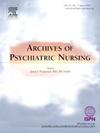正念培训计划对精神科护士幸福感和领导技能的影响
IF 2.2
4区 医学
Q1 NURSING
引用次数: 0
摘要
背景护士长需要正念,正念是减轻压力、促进身心健康和提高领导技能的有效干预措施。目的探讨正念培训计划对护士长身心健康和领导技能的影响。方法采用准研究设计,在一所精神病和神经病大学医院对 40 名护士长进行了方便抽样调查。讨论管理者必须采用正念计划,将其纳入护理干预方案,并向所有护理人员分发,因为如果认真实践并从中受益,正念计划会产生明显的影响。本文章由计算机程序翻译,如有差异,请以英文原文为准。
Effect of mindfulness training program on well-being and leadership skills of psychiatric nurses
Background
Nursing leaders need mindfulness, which is an effective intervention for reducing stress, promoting well-being, and enhancing their leadership skills.
Purpose
To explore the effect of a mindfulness training program on the well-being and leadership skills of head nurses.
Methods
A quasi-study design was used and conducted in a psychiatric and neurological university hospital on a convenience sample of 40 head nurses. Using the cognitive and affective mindfulness scale, the mindful attention awareness scale, the leadership skills questionnaire, and the mindfulness program.
Findings
The findings resulted in a significant difference in the effect of the mindfulness program before and after training when applied to leadership skills, especially conceptual and administrative skills.
Discussion
Managers must adopt a mindfulness program, integrate it into nursing intervention protocols, and circulate it to all nursing staff because it has a noticeable impact if it is practiced seriously and its results are benefited from.
求助全文
通过发布文献求助,成功后即可免费获取论文全文。
去求助
来源期刊
CiteScore
3.70
自引率
0.00%
发文量
131
审稿时长
160 days
期刊介绍:
Archives of Psychiatric Nursing disseminates original, peer-reviewed research that is of interest to psychiatric and mental health care nurses. The field is considered in its broadest perspective, including theory, practice and research applications related to all ages, special populations, settings, and interdisciplinary collaborations in both the public and private sectors. Through critical study, expositions, and review of practice, Archives of Psychiatric Nursing is a medium for clinical scholarship to provide theoretical linkages among diverse areas of practice.

 求助内容:
求助内容: 应助结果提醒方式:
应助结果提醒方式:


